You know that old bike sitting in your garage—the one that’s been collecting dust for years? Maybe it was once your weekend adventure buddy or your coffee-run ride. Now you’re thinking, where can I donate unwanted bikes or even donate broken bike? You’re not alone—I’ve been there too.
A few years ago, I had a bike I barely used. Instead of letting it rust away, I looked into where to donate used bicycles, and what I found was eye-opening. From community programs to global organizations like World Bicycle Relief Shop, my old ride could actually change someone’s life. Imagine a donated bike helping a kid get to school, a worker commute affordably, or a refugee navigate a new city. It’s not just a donation—it’s freedom on two wheels.
In this guide, I’ll walk you through the best places to donate—whether it’s a kids’ bike, an old cruiser, or one that just needs a little TLC. I’ll also share how to prep your bike for donation and even score a tax deduction. Ready to give your bike a second life? Let’s do this!
1. Why Donate Your Bicycle?
Ever think about how much a simple bike can change a life? What’s just an old, unused ride to you could be someone’s only way to get to work, school, or even a doctor’s appointment. Donating your bicycle isn’t just about clearing up space—it’s about creating opportunities. Whether it’s for a student who needs a reliable way to get to class or a worker trying to cut down on commute costs, a bike can be the difference between struggle and stability.
1.1 Giving Back to the Community
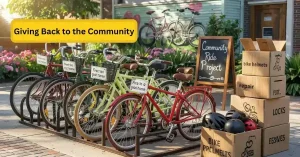
Think about your daily routine. Maybe you hop in a car, take a bus, or even walk to your destination. But for millions of people, affordable transportation is out of reach. That’s where your old bike comes in—it’s not just a donation, it’s freedom.
- A bicycle can mean a job. A donated bike can help someone get to work without relying on expensive public transport. Many cities don’t have reliable transit, and a simple bike can be a lifeline for someone trying to hold down a steady job.
- A bicycle can mean an education. In many areas, children walk miles just to get to school. A donated bike can cut that time in half, making learning more accessible.
- A bicycle can mean better health. Not just for the person riding it, but for communities. Health workers in rural areas use bikes to visit patients who wouldn’t get care otherwise. Imagine your bike helping a nurse reach a sick child in a remote village—pretty incredible, right?
Quick Answer: Donating a bicycle can give someone a way to get to work, school, or medical care, helping them become more independent and improving their quality of life.
Real-life example? I once donated a bike to a local nonprofit that refurbishes them for low-income families. A few weeks later, I got a thank-you email from a single mother who used the bike to get to her new job. That was the moment I realized—it wasn’t just an old bike, it was her way forward.
1.2 Environmental Benefits
Let’s be honest—we’ve all been guilty of tossing things out instead of repurposing them. But donating your bike isn’t just good for people, it’s good for the planet too.
- Less waste, more impact. Every year, millions of bikes end up in landfills, taking up space and adding to pollution. Instead of trashing it, why not give it a new home?
- Fewer cars, cleaner air. More bikes on the road mean less traffic and lower carbon emissions. Cities with high cycling rates have better air quality and fewer traffic jams.
- Recycling at its best. Even if your bike isn’t rideable, its parts can be reused—tires, chains, and frames can all help repair other bicycles. Some organizations even repurpose bike materials to build sustainable products!
Quick Answer: Donating a bicycle reduces waste, cuts pollution, and promotes eco-friendly transportation, making it a win-win for both people and the environment.
I once saw an old rusted bike get completely transformed at a local bike co-op. What I thought was junk turned into a fully functional ride for a student who couldn’t afford one. Seeing it fixed up and back on the road was proof that even the most worn-out bikes can still serve a purpose.
1.3 Tax Deductions & Other Benefits

Okay, so giving away a bike makes you feel good—but did you know it can also help you financially? Whether you’re looking to donate a bike near you or wondering what charity can you donate bikes to, many donations are tax-deductible, meaning you can get a little something back for your generosity.
- How it works: If you donate your bike to a 501(c)(3) nonprofit, they can give you a donation receipt. At tax time, you can claim the value of your bike as a charitable deduction—win-win!
- More than just a tax break. Some donation programs offer trade-in credits for bikes, which you can use toward a new ride. If you’re upgrading, this is a great way to give back and get something in return.
Quick Answer: Donating your bike to a registered nonprofit can give you a tax deduction while also supporting a great cause.
I remember dropping off a bike at a local charity and being surprised when they handed me a tax receipt. I wasn’t expecting anything in return, but hey—if you can help someone and get a tax break while doing it, why not?
In Summary
At the end of the day, donating your bicycle is about more than just getting rid of old gear. It’s about helping someone move forward—literally and figuratively. Whether it’s a child needing a way to school, a worker cutting down on commute costs, or a nonprofit repurposing parts, your old bike has the power to change lives.
So, ready to give your bike a second life? Up next, I’ll show you exactly where to donate bicycles—whether it’s near you, a pick-up service, or even an international cause. Let’s make an impact, one ride at a time!
2. Where to Donate Bicycles in the USA? ‘View PDF’
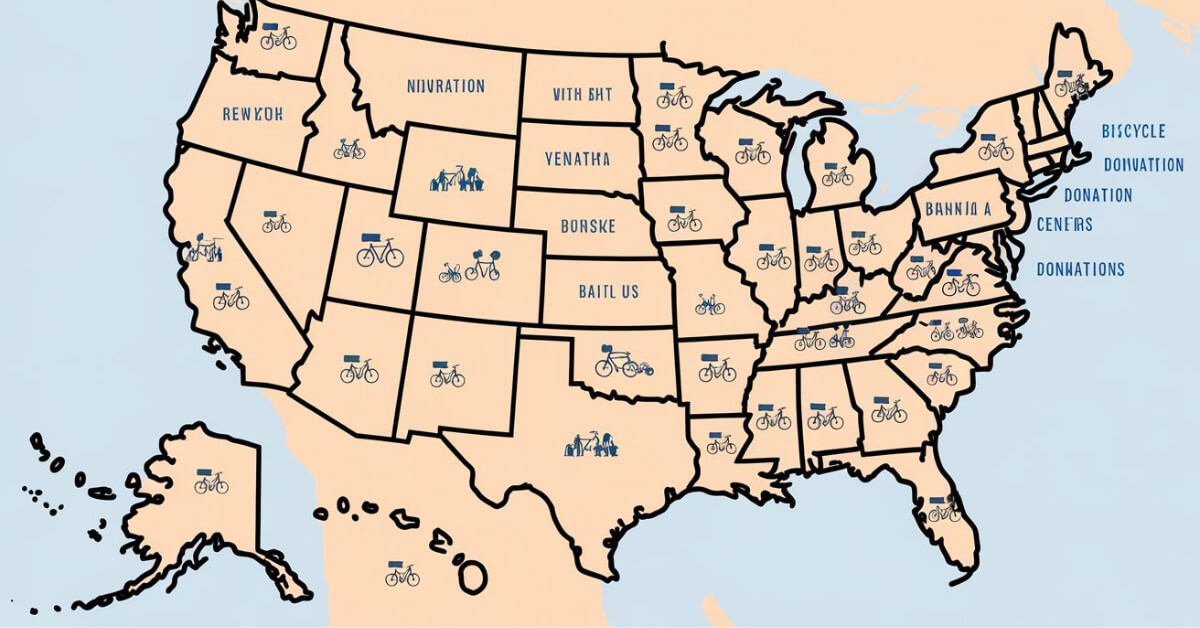
Ever look at an old bike and think, Someone could really use this? You’re right! Across the U.S., bicycles are a lifeline for many—helping people commute, attend school, and even access healthcare.
The best part? There are countless places to donate your bike, whether it’s through a local charity, a bike-specific nonprofit, or a convenient donation pick-up service. Let’s find the right one for you!
2.1 Local Donation Centers & Nonprofits
Want your bike to help someone in your own community? Local organizations refurbish and distribute donated bikes to families, job seekers, and children.
- Salvation Army – Some locations give bikes directly to people in need, while others sell them to fund community programs. Tip: Call your local branch to check if they accept bikes.
- Goodwill – Many Goodwill stores resell bikes at affordable prices, with proceeds funding job training programs. Some locations refurbish and donate them directly.
- Churches & Community Centers – Many local groups organize bike donation drives or provide bikes to refugees, low-income families, and students. Reach out to ask if they accept bikes.
Quick Answer: Donate your bike to Salvation Army, Goodwill, or a community center to help provide transportation to those in need.
A few years ago, I donated a bike to a church. A month later, I saw a young boy riding it with the biggest smile on his face. It was his first bike ever—and I realized how a simple donation can mean everything to someone.
2.2 Bicycle-Specific Donation Organizations
Some charities focus only on bicycles, ensuring your bike directly helps people who need it most.
- World Bicycle Relief Shop – Distributes bicycles to students, healthcare workers, and small business owners in developing countries where transportation is limited.
- Recycle-A-Bicycle (New York) – Repairs and donates bikes to low-income families while also teaching kids bicycle maintenance skills.
- Working Bikes (Chicago) – Collects used bikes, fixes them up, and gives them to people in need both locally and abroad. They also accept non-working bikes for parts!
- Pedals for Progress (Nationwide) – Gathers used bikes, refurbishes them, and sends them to developing countries, where transportation can change lives.
- Bicycles for Humanity – With multiple U.S. chapters, they ship donated bikes to underserved areas worldwide, helping people access work, school, and healthcare.
Quick Answer: Donate your bike to World Bicycle Relief Shop, Recycle-A-Bicycle, Working Bikes, Pedals for Progress, or Bicycles for Humanity to help both local and global communities.
A friend of mine donated a bike to Working Bikes in Chicago. Months later, she learned her old bike ended up in Africa, helping a woman commute to work safely every day. One bike. One life changed.
2.3 Bicycle Donation Pick-Up Services
Need someone to pick up your bike? No worries—some organizations offer free donation pick-up services so you don’t have to drop it off.
- PickUp Please – A service run by Vietnam Veterans of America that picks up donated bikes and sells them to fund veteran support programs.
- Bikes for the World – Collects and refurbishes bikes, offering pick-up services in select areas to send bikes to communities that need them.
- Local Bike Shops & Co-Ops – Many local bike shops partner with charities and will pick up bikes or direct you to organizations that do. Give your nearest shop a call!
Quick Answer: If you need a pick-up, check out PickUp Please, Bikes for the World, or call your local bike shop for options.
A buddy of mine had two bikes to donate but no way to transport them. He found PickUp Please, scheduled a free pick-up, and within days, his bikes were on their way to helping veterans. It was effortless and made a real difference.
In Summary
No matter where you donate, your bike will make an impact. It could help a child get to school, a worker save money on transportation, or a healthcare worker reach patients in remote areas.
Up next, I’ll show you how to prepare your bike for donation—from simple cleaning to making sure you get a tax deduction!
3. Where Can I Donate Different Types of Bicycles?
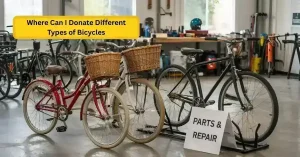
Ever look at an old bike and think, What should I do with this? Maybe it’s your kid’s first bike that’s been outgrown, a trusty commuter that’s seen better days, or a vintage cruiser collecting dust. Whatever the case, there’s someone out there who needs it.
The key? Matching your bike with the right donation program. Some organizations focus on children’s bikes, while others refurbish older bikes or recycle parts from unusable ones. Let’s find the best home for yours!
3.1 Where Can I Donate Kids’ Bicycles?

Kids grow fast, and their bikes don’t always keep up. Instead of letting them gather dust, why not pass them on to a child who truly needs one?
- Toys for Tots – Known for its holiday gift drives, Toys for Tots accepts gently used kids’ bikes to make sure more children experience the joy of cycling.
- Free Bikes 4 Kidz – This nonprofit collects, fixes, and donates bikes to kids from low-income families, giving them a fun and reliable way to get around.
- School & Community Programs – Many schools, after-school programs, and YMCAs accept kids’ bikes for gym classes or transportation assistance.
Quick Answer: Donate kids’ bikes to Toys for Tots, Free Bikes 4 Kidz, or school programs to ensure they go to children who need them most.
A friend of mine donated her son’s old bike to Free Bikes 4 Kidz. A few months later, she got a thank-you email with a photo of a beaming little girl. That bike wasn’t just a donation—it was her ticket to adventure.
3.2 Where Can I Donate Used Bicycles?
If you’ve got a bike that’s still rideable, it can make a world of difference to someone in need. Many people rely on bikes for work, school, and daily errands but can’t afford one.
- Local Bike Shops & Co-ops – Many bike shops work with nonprofits to refurbish and donate bikes. Call your nearest bike shop to see if they accept donations!
- Community Bike Programs – Nonprofits like Recycle-A-Bicycle (NY) and Working Bikes (Chicago) restore used bikes and give them to those who need affordable transportation.
- Vocational & Rehabilitation Programs – Some correctional facilities and community centers teach bike repair skills to inmates or at-risk youth, then donate the restored bikes.
Quick Answer: Donate used bikes to local bike shops, community programs, or vocational centers that refurbish and distribute them.
I donated my old commuter bike to a local co-op. A month later, I saw someone riding it around town. Knowing my bike got a second life made my day.
3.3 Where Can I Donate Old Bicycles?
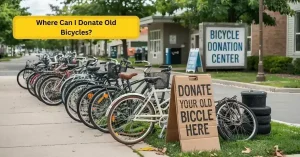
Not all bikes are road-ready. But even if yours is rusted, broken, or missing parts, it can still be useful. Many people search how to donate broken bikes, and the good news is—there are options.
- Bike Co-Ops & Repair Shops – Some organizations strip old bikes for usable parts, helping repair other donated bikes.
- Prison & Vocational Programs – Inmates at some correctional facilities learn bike mechanics as a trade skill, using donated bikes for training.
- Recycling Centers – If your bike is beyond repair, many scrap and recycling centers accept metal frames, chains, and rubber tires.
Quick Answer: Donate old bicycles to bike co-ops, repair shops, or vocational programs that salvage parts and rebuild bikes.
I took my rusted-out mountain bike to a local bike co-op. It couldn’t be fixed, but they reused the tires, pedals, and brakes to refurbish other donated bikes. Even a broken bike can still have value!
3.4 Where Can I Donate Unwanted Bikes?
Sometimes, you just want your bike gone, but you also want it to help someone. These options ensure your donation finds a good home.
- Homeless & Refugee Shelters – Many organizations provide bikes to job seekers, students, and new arrivals who need affordable transportation.
- Bike Trade-In Programs – Some bike shops offer trade-in credits when you donate a bike, which can go toward a new purchase.
- Global Bike Charities – Organizations like Bicycles for Humanity and Pedals for Progress send donated bikes to communities in Africa, Latin America, and Asia.
Quick Answer: Donate unwanted bikes to shelters, trade them in at bike shops, or support global bike charities.
One of my friends donated an old cruiser to a refugee support program. A few months later, she found out it helped someone commute to work without spending money on bus fare. That’s impact!
3.5 Where is the Best Place to Donate a Bicycle?
The best place to donate depends on:
- Condition of the bike – If it’s rideable, donate it to a charity that gives bikes directly to people in need. If it’s not, give it to a repair co-op or recycling center.
- Who you want to help – Local charities like Goodwill and Salvation Army support nearby communities, while groups like World Bicycle Relief help globally.
- Convenience – Need a pick-up? Try PickUp Please or Bikes for the World. Want to drop it off? Check local bike shops or nonprofits.
Quick Answer: The best place to donate depends on the bike’s condition, location, and who you want to help—local families, job seekers, or international communities.
A good rule of thumb? If the bike still works, give it where it can be ridden. If it’s broken, donate it where the parts can be reused.
In Summary
No matter what type of bike you have, someone out there can use it. Whether it’s a child’s first ride, a worker’s way to get to their job, or a salvaged frame helping rebuild other bikes, your donation makes a difference.
Next up, I’ll show you how to prepare your bike for donation—from simple cleaning tips to making sure you get a tax deduction!
4. How to Prepare Your Bicycle for Donation?

So, you’ve decided to donate your bike—amazing! But before you hand it over, a little prep work can go a long way. A clean, functional bike not only makes things easier for donation centers but also ensures the new owner gets a smooth and safe ride.
Think of it like gifting a pair of shoes. Would you hand over a pair covered in mud with broken laces? Probably not. The same goes for bikes! Let’s make sure yours is donation-ready with these easy steps.
4.1 Cleaning & Basic Repairs
A little TLC can turn an old, dusty bike into someone’s new favorite ride. Even if you’re donating it to a refurbishing program, a quick clean-up shows care and makes the process easier for the next owner.
- Wipe It Down – Grab a damp cloth and clean off the dust, cobwebs, or dirt. If it’s extra grimy, a little soap and water can work wonders.
- Check the Tires – Are they still holding air? If they’re flat but not torn, they may just need some inflation. If they’re cracked, you can still donate the bike—just let the organization know.
- Tighten Loose Parts – Give the handlebars, seat, and pedals a little shake. If anything feels wobbly, a quick turn of a wrench can help. If you’re not sure how to fix it, don’t worry—many donation centers take care of repairs.
Quick Answer: Before donating, give your bike a quick wipe-down, check the tires, and tighten any loose parts. This makes the transition smoother for the next rider.
I once donated an old cruiser that had been sitting in my garage for years. Before dropping it off, I cleaned it up and pumped the tires. The guy at the donation center actually thanked me, saying, “You wouldn’t believe how many bikes come in covered in dust and cobwebs!” A small effort makes a big difference.
4.2 Checking for Accessories
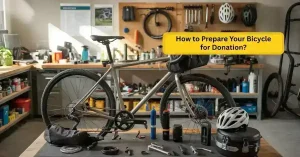
Got extra bike gear lying around? Don’t let it go to waste! Many cyclists rely on donated bikes for daily transportation, so things like helmets, locks, and lights can make a huge difference.
- Helmets & Locks – Safety first! A helmet protects the rider, and a lock keeps their bike secure. If you have an extra one, it could be life-changing for someone who depends on their bike.
- Lights & Reflectors – Not everyone rides during the day. If you have extra bike lights or reflectors, donating them can help someone stay safe on the road at night.
- Bike Tools & Spare Parts – Got an extra pump, multi-tool, or spare inner tube? Many organizations refurbish bikes, so they’ll put these to good use.
Quick Answer: If you have spare helmets, locks, or bike accessories, donate them too—they can make a huge difference in someone’s safety and comfort.
A friend of mine once donated a used bike lock along with his bike. A few weeks later, he got a thank-you note from a college student who said it helped them commute safely without worrying about theft. Sometimes, the little things matter most.
4.3 Getting a Tax Deduction Receipt
Did you know that donating your bike can also save you money on taxes? Many donation centers are 501(c)(3) nonprofits, which means your donation is tax-deductible.
How to Claim a Tax Deduction
- Ask for a receipt – When you drop off your bike, request a donation receipt for tax purposes
- Estimate your bike’s value – Organizations like Goodwill and Salvation Army provide valuation guides to help you determine how much your bike is worth.
- Keep your records – At tax time, use the receipt to claim a deduction when filing your return.
Quick Answer: If donating to a 501(c)(3) nonprofit, ask for a receipt—you can claim a tax deduction based on your bike’s value.
I learned this the hard way! The first time I donated a bike, I forgot to ask for a receipt. The next year, when I donated another bike, I made sure to get one, and it saved me $50 on my taxes. That’s enough for a nice dinner—or, let’s be honest, a new bike accessory!
In Summary
Taking a few extra minutes to clean, check, and prepare your bike makes a big difference. Whether it’s a kid getting their first bike, a worker commuting to their job, or a student navigating campus, your donation matters.
Up next, I’ll answer common questions about bike donations—including what to do if your bike needs repairs, where to donate near you, and how donated bikes help people worldwide.
Final Thoughts
Still have a bike collecting dust? Donate it! Whether it’s a kids’ bike, an old commuter, or even broken, someone out there can use it.
Next up: I’ll show you how to take action—find the right place, schedule a pickup, and give your bike a second life!
In Conclusion: Give Your Bike a Second Life!
That old bike in your garage? It’s not just clutter—it’s a ticket to freedom for someone else. Maybe it was your weekend adventure buddy or your go-to ride for coffee runs. But now, it’s just sitting there, gathering dust. Instead of letting it waste away, why not pass it on to someone who needs it?
Knowing where to donate bicycles can make all the difference. A donated bike can help a worker get to their job, a student make it to school on time, or a healthcare worker reach patients in remote areas. I once donated a bike through a local nonprofit, and a month later, I got a message from a mom who was using it to commute to her new job. That moment made me realize: one simple donation can change a life.
It’s also a win for the planet! Every year, millions of bikes end up in landfills. But organizations like World Bicycle Relief and Bikes for the World refurbish and distribute them where they’re needed most. Instead of rusting away, your bike could be out there, rolling through city streets or rural roads, helping someone get where they need to go.
Quick Answer: If you’re wondering where to donate bicycles, check out local nonprofits, bike co-ops, or global organizations. Many even offer free pickup services. And don’t forget—donations to 501(c)(3) nonprofits may be tax-deductible, so ask for a receipt!
So, what’s stopping you? Find a donation center, schedule a pickup, and send your bike on its next adventure. Someone out there is waiting for the ride of their life—your old bike just might be it.
Frequently Asked Questions (FAQ)
Where can I donate a bike in Michigan?
If you’re in Michigan, try reaching out to local Goodwill branches, community bike co-ops, or even search Pedals for Progress for Michigan drop-off points. You can also call local bike shops to ask if they accept used bikes for donation or refurbishment.
Can I donate a bike that needs repairs?
Yes! Many charities accept bikes that need small repairs. Volunteers fix them before giving them to new riders. If your bike is beyond repair, some groups will still take it for parts or recycling.
Quick Answer: You can donate bikes that need repairs. If it can’t be fixed, it may still be used for parts.
I donated a bike with a flat tire and a rusty chain. I thought it was junk, but the shop fixed it and gave it to a teenager. That bike got a new life!
What happens to donated bicycles?
It depends on the group! Some give bikes to people who need transportation. Others sell them to raise money for programs. Some ship bikes to developing countries. Others take old bikes apart and use the parts.
Quick Answer: Donated bikes help people, fund programs, or get recycled for parts.
A friend donated a bike to a charity. Later, she learned it went to a doctor in Africa who used it to visit patients. A small gift can change a life!
Is my donation tax-deductible?
Yes! If you donate to a 501(c)(3) nonprofit, you can claim a tax deduction. Just ask for a receipt when you donate. You’ll need it when filing your taxes.
Quick Answer: Yes! Donate to a nonprofit, ask for a receipt, and claim a tax deduction.
The first time I donated a bike, I forgot the receipt. The next time, I asked for one. It saved me $50 on taxes. Lesson learned!
Where can I donate a bike near me?
Many places take bike donations! Try:
- Salvation Army & Goodwill – Some locations accept bikes.
- Bike shops & co-ops – Many repair and donate bikes.
- Churches & community groups – Often hold donation drives.
- Online donation finders – Try sites like Pedals for Progress or Bikes for the World.
Quick Answer: Donate at Salvation Army, Goodwill, bike shops, or search online for local drop-offs.
I called my local bike shop, and they pointed me to a charity that fixes bikes for kids. One quick call made all the difference!
How do donated bikes help people in other countries?
For many, a bike is more than a ride—it’s a way to survive. Donated bikes help students get to school, workers get to jobs, and doctors reach patients. Groups like World Bicycle Relief send bikes to people in need.
Quick Answer: Donated bikes help people in need get to school, work, or medical care.
One charity shared a story of a 13-year-old girl in Zambia. Before she got a donated bike, she walked miles to school. Now, she rides there in minutes. One bike changed her future.
Read Next…
Best regards,
~Team BikeBicycler
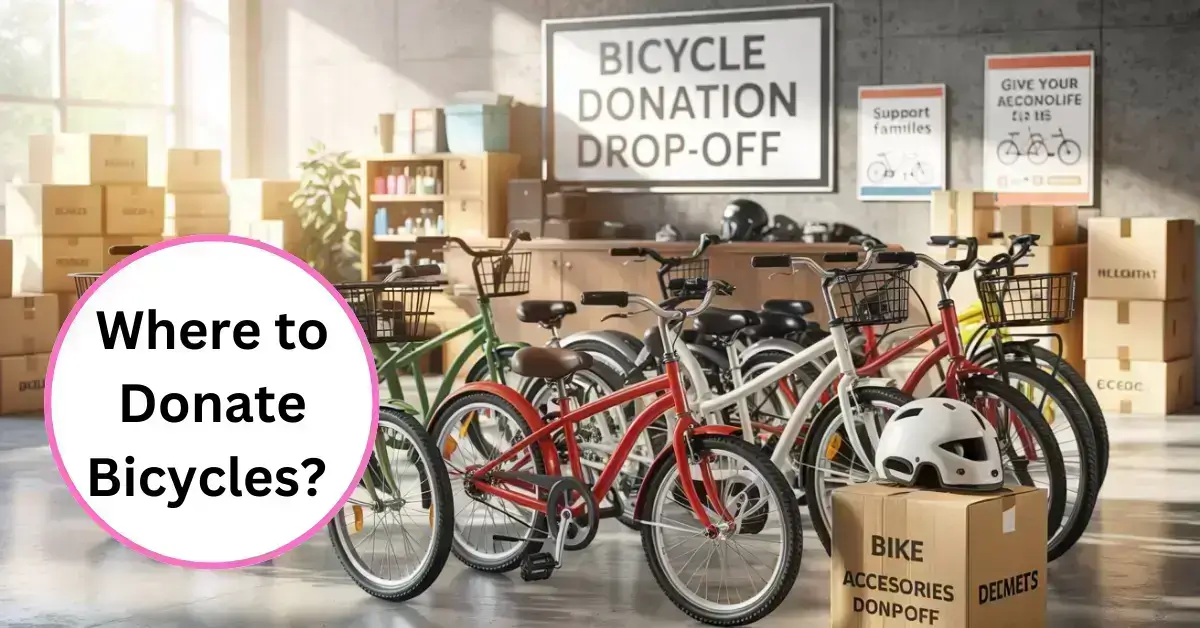
Hello Bike Bicycler,
All Four One hosting All Four One 2025″ Challenge providing brand new bikes to low income reduced and free lunch program students attending Westside Christian Academy. Wednesday, May 28, 2025.